|
|
|
Sort Order |
|
|
|
Items / Page
|
|
|
|
|
|
|
| Srl | Item |
| 1 |
ID:
167447
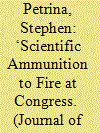

|
|
|
|
|
| Summary/Abstract |
This article explains how exploitation of research and development (R&D) configured into the post–World War II policies of the U.S. Army Air Forces (AAF) and U.S. Air Force (USAF). The narrative follows the coordination of operations LUSTY, OVERCAST, and PAPERCLIP and the Scientific Advisory Group (SAG) in the AAF’s exploitation of intelligence and reparations for postwar policies and politics. The history of the SAG’s efforts from 1944 to 1947 reveals the intensity with which the AAF and its consultants in the aeronautical sciences pursued Nazi R&D. The article helps explain the place of intelligence and reparations in AAF and USAF policies for postwar R&D.
|
|
|
|
|
|
|
|
|
|
|
|
|
|
|
|
| 2 |
ID:
107774


|
|
|
|
|
| Publication |
New Delhi, Hachette India, 2011.
|
| Description |
xv, 295p.
|
| Standard Number |
9789350090770, hbk
|
|
|
|
|
|
|
|
|
|
|
|
Copies: C:1/I:0,R:0,Q:0
Circulation
| Accession# | Call# | Current Location | Status | Policy | Location |
| 056267 | 324.254/KID 056267 | Main | On Shelf | General | |
|
|
|
|
| 3 |
ID:
073464
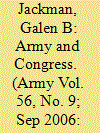

|
|
|
| 4 |
ID:
072951
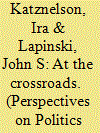

|
|
|
|
|
| Publication |
2006.
|
| Summary/Abstract |
Congress has been situated on the outside edge of the subfield of American Political Development (APD) despite the institution's centrality both to the political history of the United States and to political science as a discipline. Apart from an important but limited number of works-including a long-term research enterprise on the role of sectionalism conducted by Richard Bensel, a study of the antebellum Senate by Elaine Swift, an assessment of the alliance between farmers and workers in the half-century after 1877 by Elizabeth Sanders, a major work on institutional transformations in the House and Senate by Eric Schickler, and a small number of emergent inquiries-"scholars in the American Political Development tradition," as Keith Whittington has noted, "have never fully integrated Congress, as they have other important institutions such as the bureaucracy, the presidency, political parties and the courts."
|
|
|
|
|
|
|
|
|
|
|
|
|
|
|
|
| 5 |
ID:
132946
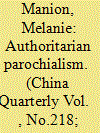

|
|
|
|
|
| Publication |
2014.
|
| Summary/Abstract |
This article draws on evidence from loosely structured interviews and data from original surveys of 5,130 delegates in township, county and municipal congresses to argue that congressional representation unfolds as authoritarian parochialism in China. It makes three new arguments. First, popularly elected local congresses that once only mechanically stood in for the Chinese mass public, through demographically descriptive and politically symbolic representation, now work as substantively representative institutions. Chinese local congressmen and women view themselves and act as "delegates," not Burkean trustees or Leninist party agents. Second, this congressional representation is not commonly expressed in the quintessentially legislative activities familiar in other regime types. Rather, it is an extra-legislative variant of pork-barrel politics: parochial activity by delegates to deliver targeted public goods to the geographic constituency. Third, this authoritarian parochialism is due to institutional arrangements and regime priorities, some common to single-party dictatorships and some distinct to Chinese authoritarianism.
|
|
|
|
|
|
|
|
|
|
|
|
|
|
|
|
| 6 |
ID:
158602
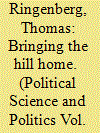

|
|
|
| 7 |
ID:
120056
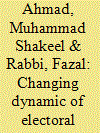

|
|
|
| 8 |
ID:
146024
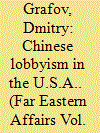

|
|
|
|
|
| Summary/Abstract |
The author analyzes the lobbyism of U.S. interests in China and the counterlobbyism of Chinese interests in the U.S. in its executive and legislative bodies. Special attention is paid to the reciprocal coordination of these interests and mechanisms with whose help the Chinese authorities are trying to influence the adoption of political decisions in the U.S. Congress and presidential administration. Concrete examples of the interaction between American and Chinese lobbyists are cited.
|
|
|
|
|
|
|
|
|
|
|
|
|
|
|
|
| 9 |
ID:
084785
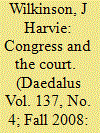

|
|
|
| 10 |
ID:
084786
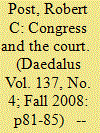

|
|
|
| 11 |
ID:
149640
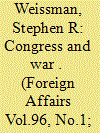

|
|
|
|
|
| Summary/Abstract |
It is easy to conclude that the U.S. Congress is simply incapable of playing a constructive role in matters of war and peace. Paralyzed by gridlock, the hyperpartisan body regularly betrays its constitutional responsibility to act as a serious check on the executive branch, often preferring instead to launch ideological crusades aimed at scoring political points. Congress has spent thousands of hours on deeply partisan investigations of the murders of four U.S. officials and contractors in Benghazi, Libya, but refrained from making any decision on the military intervention that brought them to that chaotic city in the first place. Although the Obama administration began arming and training rebels in Syria over three years ago, neither chamber of Congress has held a debate over the U.S. policy in the civil war there.
|
|
|
|
|
|
|
|
|
|
|
|
|
|
|
|
| 12 |
ID:
099987
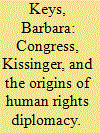

|
|
|
|
|
| Publication |
2010.
|
| Summary/Abstract |
The Congressional "human rights insurgency" of 1973-1977 centered on the holding of public hearings to shame countries engaging in human rights abuses and on legislation cutting off aid and trade to violators. Drawing on recently declassified documents, this article shows that the State Department's thoroughly intransigent response to Congressional human rights legislation, particularly Section 502B, was driven by Kissinger alone, against the advice of his closest advisers. Many State Department officials, usually from a mixture of pragmatism and conviction, argued for cooperation with Congress or for taking the initiative on human rights issues. Kissinger's adamant refusal to cooperate left Congress to implement a reactive, punitive, and unilateral approach that would set the human rights agenda long after the Ford administration left office.
|
|
|
|
|
|
|
|
|
|
|
|
|
|
|
|
| 13 |
ID:
147680
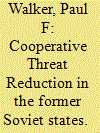

|
|
|
|
|
| Summary/Abstract |
The US Cooperative Threat Reduction (CTR) program, founded in the early 1990s to secure Soviet weapons of mass destruction (WMD)—nuclear, chemical, and biological—and promote WMD nonproliferation, has enjoyed great success. CTR has spent over $10 billion in the last twenty-five years to help eliminate thousands of nuclear warheads, dozens of nuclear submarines, 35,000 metric tons of chemical agent, and thousands of strategic missiles, bombers, and missile silos in former Soviet states. But it has also been beset with numerous funding, political, bureaucratic, technical, and planning challenges. The author reviews the history of CTR funding and legislation, discusses obstacles to implementation, and identifies five broad lessons from the program's early experiences that are applicable to future global security projects.
|
|
|
|
|
|
|
|
|
|
|
|
|
|
|
|
| 14 |
ID:
129385
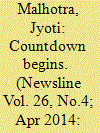

|
|
|
|
|
| Publication |
2014.
|
| Summary/Abstract |
Who will emerge victorious in India's May 2014 elections? Shehzada Rahul, the chaiwala form Gujarat, Narendra Modi, AK 49' Arvidn Kejriwala, or someone else? experts predict a land-slide victory for the BJP but history- as previously proven-may have something else in store for India.
|
|
|
|
|
|
|
|
|
|
|
|
|
|
|
|
| 15 |
ID:
160941
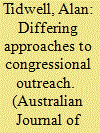

|
|
|
|
|
| Summary/Abstract |
Both Australia and New Zealand, in addition to engaging with the US executive branch, also protect and advance their bilateral relationship by engaging with the US Congress. Since 1987, Australia has pursued congressional outreach, or diplomatic lobbying, to protect and advance its security and trade interests. As a result, Australia has won both security and trade benefits. New Zealand's congressional outreach, on the other hand, has had a more challenging task of improving bilateral relations due, in part, to US objections to New Zealand's anti-nuclear policy. This article extends existing research on Australian and New Zealand congressional outreach, develops a framework for examining embassy-based congressional outreach and, through comparative analysis of Australian and New Zealand congressional outreach, gives greater insight into the nature and character of their efforts on Capitol Hill.
|
|
|
|
|
|
|
|
|
|
|
|
|
|
|
|
| 16 |
ID:
153628
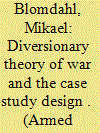

|
|
|
|
|
| Summary/Abstract |
This article examines President Clinton’s decisions to launch military actions against Iraq in June 1993 and Kosovo in 1999. This study represents an attempt to test the descriptive accuracy and further developing the diversionary theory of war. Using a qualitative framework for diversionary use of force developed by another researcher, Ryan C. Hendrickson, this research examines and compares the two cases in order to determine whether or not these strikes appear to be diversionary in nature. This article generally suggests that empirical support for the diversionary argument in these cases is “mixed” but has more validity in the actions against Iraq. Two proposals to further develop qualitative tests for diversionary use of force are advanced.
|
|
|
|
|
|
|
|
|
|
|
|
|
|
|
|
| 17 |
ID:
100275


|
|
|
|
|
| Publication |
2010.
|
| Summary/Abstract |
While sociologists and political scientists have become interested in the role of ideas in the political process, relatively little work looks at how ideological claims are actually deployed in political discourse. This article examines the economic claims made in two pairs of Congressional debates over tax cuts, one (in 1962 and 1964) generally associated with Keynesian economic theories, and one (in 1978 and 1981) tied to supply-side ideas. While these bills were indeed initiated by groups subscribing to different economic ideologies, subsequent debates look surprisingly similar. The bills were closer in substance than one might expect, and while their proponents came from opposite political camps, in both cases supporters focused more on supply-side than demand-side effects and emphasized tax cuts' ability to pay for themselves through economic stimulation. The authors propose that politically acceptable economic claims may evolve more slowly than the economic theories that inspire policy entrepreneurs, and that this "discursive opportunity structure" may not only constrain the political process but may potentially shape the political effects of expert knowledge.
|
|
|
|
|
|
|
|
|
|
|
|
|
|
|
|
| 18 |
ID:
083746
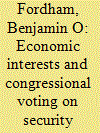

|
|
|
|
|
| Publication |
2008.
|
| Summary/Abstract |
Most research on congressional consideration of foreign and defense policy concludes that ideology is the most important influence on roll-call voting and that constituent economic interests are not very important. This article challenges this conclusion on two grounds. First, most previous research conceives of constituent economic interests on these issues very narrowly, examining only the benefits constituents obtain from providing military goods and services rather than their economic stakes in the broader goals of national security policy. Second, the effect of ideology on congressional voting has changed enormously over time, a fact that poses difficulties for research that has stressed this consideration. The effects of broader economic interests and the changing implications of ideology are tested using a sample of key Senate votes on military resource allocation, intervention, and foreign aid from 1947 through 2000.
|
|
|
|
|
|
|
|
|
|
|
|
|
|
|
|
| 19 |
ID:
151139
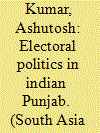

|
|
|
|
|
| Summary/Abstract |
The forthcoming Assembly elections in Punjab in early
2017 indicate signs of a new phase in the electoral history of this
state, largely dominated earlier by various political alliances headed
by the Shiromani Akali Dal (SAD) under Jat Sikh leadership.
Presented within the wider Indian electoral landscape, this article
offers an analytical overview of Punjab’s electoral politics as it has
evolved since partition from the vantage point of SAD. It is argued
that there are several good reasons why traditional SAD domination
and style of leadership are presently being challenged through a
combination of new political actors and, significantly, changing
awareness among a very diverse electorate about what to expect
from any government one elects.
|
|
|
|
|
|
|
|
|
|
|
|
|
|
|
|
| 20 |
ID:
177660
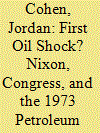

|
|
|
|
|
| Summary/Abstract |
This article investigates whether the United States had prior knowledge of the 1973 oil crisis instituted by Arab countries in 1973. It argues, using predominantly primary source documents, that as early as 1971, Washington understood the Arab nations were willing to use oil as an economic weapon. Furthermore, government officials had drafted contingency plans to ameliorate the enormous deleterious economic impact. Unfortunately, the gridlocked Congress and the erosion of executive power associated with the unfolding of the Watergate scandal thwarted any possibility of the Nixon Administration’s economic response to these developments being implemented. This article contributes new primary source research and contextualizes the crisis within the framework of a gridlocked Congress to add to the existing debate concerning America’s preparations for and failure to respond to the 1973 oil crisis.
|
|
|
|
|
|
|
|
|
|
|
|
|
|
|
|
|
|
|
|
|